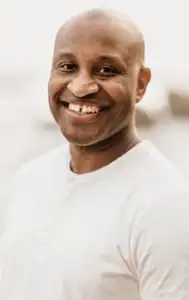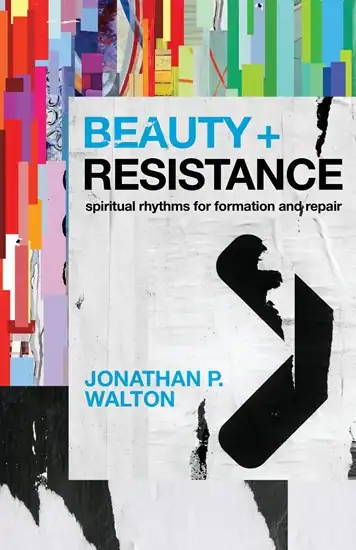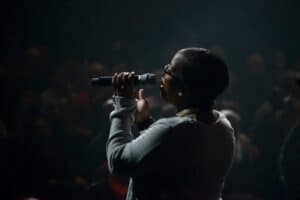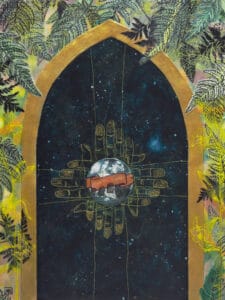 Justice-seeking Christians often find themselves running on empty—exhausted, reactive, and spiritually disoriented in the face of unrelenting need. In his new book, Beauty and Resistance, author and spiritual leader Jonathan P. Walton invites readers into a different way—one rooted in rest, restoration, resistance, and repetition.
Justice-seeking Christians often find themselves running on empty—exhausted, reactive, and spiritually disoriented in the face of unrelenting need. In his new book, Beauty and Resistance, author and spiritual leader Jonathan P. Walton invites readers into a different way—one rooted in rest, restoration, resistance, and repetition.
Through personal story, biblical wisdom, and practical tools, Walton shows how cultivating beauty is not a distraction from the work of justice but a vital form of resistance—especially for communities historically dehumanized and excluded. We spoke with him about the journey that shaped this book, the rhythms that sustain him, and why the work of resistance must begin in the soul.
 Your book begins with a sobering reality: many justice-seeking Christians feel exhausted, reactive, or spiritually disoriented. What led you to write Beauty and Resistance, and how do you hope it meets people in that place of burnout and longing?
Your book begins with a sobering reality: many justice-seeking Christians feel exhausted, reactive, or spiritually disoriented. What led you to write Beauty and Resistance, and how do you hope it meets people in that place of burnout and longing?
Walton: I wrote Beauty and Resistance because in 2017, I had two book proposals: one for Twelve Lies that Hold America Captive and another for The Emotionally Healthy Activist. I asked my wife and my team which book was right for the moment. Plainly, I learned I could write Twelve Lies and stand on its principles. But if I wrote what would become Beauty and Resistance, I would be lying. I didn’t have the spiritual, emotional, and relational scaffolding to hold myself up and together. The book would have been performative at best and dishonest at worst if it came out in 2018.
This book is the story of how I changed my life—and how I will continue to change and grow to ensure I have the inner resources to sustain my outer activity.
You introduce a “rule of life” rooted in rhythms of rest, restoration, resistance, and repetition. Why do you believe these rhythms are necessary scaffolding for justice work, especially in a culture that rewards urgency and overwork?
Walton: I am loved and lovable. So are you, and every person reading this sentence. But culture and history have twisted us into creatures who can’t remember and don’t believe that truth. We must commit ourselves desperately to believing and remembering it, because it’s this love that is at the root of God’s justice, his kingdom, and our leaving fear behind to do beautiful and revolutionary things.
The individuals and institutions that oppress, abuse, marginalize, and violate the most vulnerable parts of our planet and its people are entrenched, committed, and unrelenting. So, too, must our commitment be to love. Without regular action, play, and contemplation flowing from this reality, we will burn out. With it, we can be whole, fruitful people and communities.
The pairing of beauty and resistance is striking. How do you see beauty functioning not as escape, but as a form of resistance itself—especially for communities who have been historically dehumanized or excluded?
Walton: Someone said, “We are formed by God, deformed by the world, and reformed in Christ.” The systems, unhealthy family patterns, and our wills bent toward something other than the kingdom of God leave us misshapen. We were not made exclusively for income generation or constant striving for comfort and accumulation.
So to choose to linger while looking at a flower, truly savor a meal, walk for too long in a park, sit longer than scheduled with a friend, or play a few more minutes with a child—on purpose—postures us against the patterns of the world. That’s resistance, because society calls it wrong, unproductive, inefficient, lazy—labels many of us were taught to associate with “those people.”
For marginalized folks whose historical and often internalized value is based on production, labor, and output, seeking and reflecting on beauty is resistance. Hierarchy and domination told us we don’t deserve it; Jesus says otherwise.
In the book, you write that “working out of rest, not for rest” is a kingdom principle. What does that reversal look like practically in the life of a justice-oriented Christian today?
Walton: We must shift our thoughts and actions toward seeing and living as though Sabbath is the beginning of the week, not the end. We must start to view sundown as the beginning of the day, when we go to bed—not when our alarm clock goes off or the sun comes up.
If justice-oriented and justice-involved folks start to do that, then when the opportunity for protest, policy change, or organizing comes up, we won’t see “rest” as a reward for good work but as the place from which we live. Jesus isn’t looking for employees or interns, but disciples. And if we’re going to follow Jesus for the long term, abiding in him is the beginning—not the end—of each day.
You’re clear that the work of resistance must include both interior healing and collective action. How can spiritual formation help us avoid performative justice or activist burnout, and instead cultivate sustainable wholeness for the long haul?
Walton: John the Baptist said, “A man can only give what has been granted to him from Heaven,” and there are many people testifying to a love, freedom, and justice they don’t know anything about. Jesus called us to be his witnesses, not his lawyers.
Our testimonies are what make us living stones. The inner work produces outer fruit, and the activity brings deep, abiding joy to our souls. This joy of the Lord is our strength and sustains us. We teach through living testimony, and the fruit of the Gospel—preached in word, deed, and power—is abundant life for those who speak, lead, and observe. If this was the economy in our faith communities, our lives together could persevere.
Many of our readers are leading others—pastors, educators, organizers, or caregivers. How might Beauty and Resistance help leaders model a different way of engaging justice that prioritizes presence, rest, and soul-deep clarity?
Walton: I talked about Sabbath but didn’t practice it. I taught about generosity but didn’t do the inner and relational work around money to be a cheerful giver. I ran from emotions or stuffed them down, hoping they wouldn’t get out, but told everyone else to tell me how they felt.
We must raise the floor of leadership so that the sermons we preach are lived out in our lives. We must communicate a basic standard: If you are not able to say, “I did” or “I saw” or “I felt” before the lesson, perhaps someone else should be up front, online, or platformed. This isn’t about perfection, but integrity.
Often, discipleship resources and experiences expose places where we lack integrity but don’t give us paths to progress. I wrote a book that is about deliverance and discipleship—not one over the other, but their integration at every level.
You speak honestly about limits—our need to live within them and honor them. In a world that constantly asks us to do more, how do you discern what’s yours to carry and what you must entrust to God or community?
Walton: Over the years, I worked to develop a resource called PACE Yourself: Pray, Assess, Collaborate, and Establish. It’s not a silver bullet or spiritual elixir, but a process that helps me say yes and no when my wounds or whims might lead me toward the shiny thing.
We must have rhythms of talking with and listening to God—that is prayer. We must open our eyes to see what is around us, investigate where God is moving, and discern who and what he has truly given us to give. From there, we remember that we are part of the body of Christ, so we need our neighbors and fellow believers.
With clear heads, full hearts, and open hands, we work together toward fruitful community. After those steps, we can build communal rhythms that ensure whatever is fledgling can flourish. That’s one way I Pray, Assess, Collaborate, and Establish. PACE helps me process justice issues through a kingdom filter rather than through whatever wound might have me bound in the moment.


